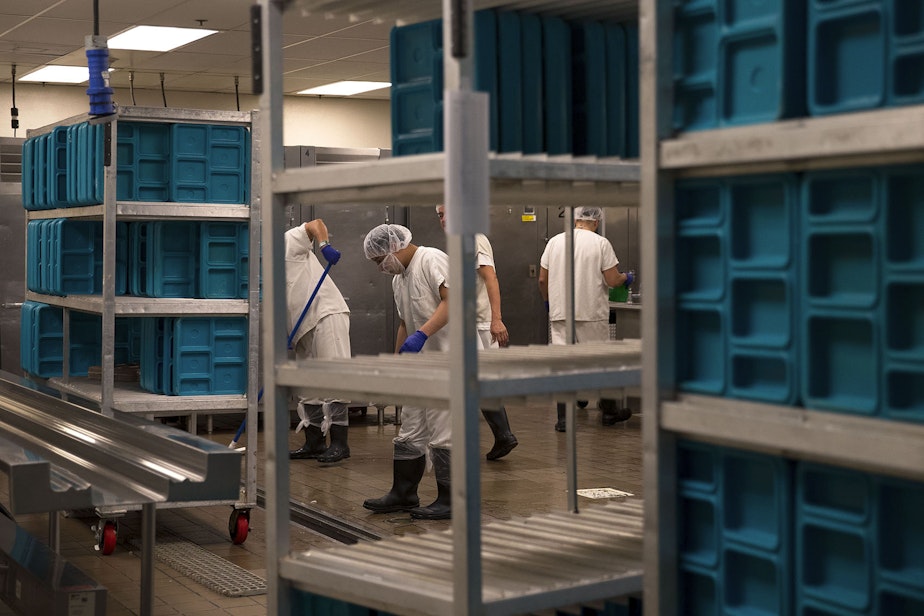Private immigrant prison in Tacoma must now pay working detainees minimum wage

A federal jury ruled this week that GEO Group, the company that runs the Northwest ICE Processing Center for immigrants, must pay working detainees the state’s minimum wage. Thousands of past detainees are eligible for back pay in a multi-million dollar class action lawsuit.
For more than a decade, GEO Group has used the thousands of locked up detainees at its Tacoma facility to perform all kinds of tasks and upkeep — cleaning toilets, washing floors, running the kitchen. It's all handled by people waiting on their immigration cases to work their way through the courts. And the pay for a full days work at the for-profit prison: $1 per day.
“Sometimes they wouldn't even get that dollar a day. They would be given a soda can or a bag of chips or a candy bar,” says Maru Mora-Villalpando, a community organizer with the advocacy group La Resistencia, “So it's just exploitation. And what the jury said is, ‘no, if you're gonna have people working, you have to pay them.’”
The $1 has been heavily relied upon by detained workers.
"It gives them money with which they can make phone calls to their family members; they're charged inordinate amounts just to call their families." said Matt Adams, legal director of the Northwest Immigrant Rights Project. "Also, to supplement a very meager diet that they're provided. It would help provide them with resources for basic necessities."
"I would just note that the hundreds and thousands of people who have been locked up at this detention center have been there for civil immigration proceedings," Adams added. "That means they're not being punished for a crime. Because this is a civil process, neither the private corporation nor the federal government has the right to punish them. Washington state law is clear that there is not an exception for private corporations to permit people to work for them without paying them the minimum wage."
Sponsored
Wage theft lawsuit
The jury’s verdict follows a 2017 lawsuit from state Attorney General Bob Ferguson.
In a statement Ferguson said, “this multi-billion dollar corporation illegally exploited the people it detains to line its own pockets. Today’s victory sends a clear message: Washington will not tolerate corporations that get rich violating the rights of the people.”
GEO Group will have to start paying working detainees $13.69 an hour, which is Washington state's minimum wage. Mora-Villalpando calls a victory. But she says the decision also raises a lot of new questions.
Like: how will detainees get paid? Right now they get their daily dollar through the privately run commissary. Will GEO Group set up a payroll system? If detainees become paid employees, can they unionize?
Sponsored
GEO Group did not respond to a request to answer these questions.
On the first day the company was required to start paying detainees minimum wage, Mora-Villalpando says they did not send out workers to their usual shifts. Instead they had guards serve food to detainees.
"The other side of it is whether that will then result in more jobs in the local community, because they'll no longer be able to take advantage of this, basically, free labor," Adams said.
Back pay
The prison company not only has to start paying a new hourly wage, they also owe thousands of past detainees back pay who worked at the facility.
Sponsored
"There's still a lot to be developed here," Adams said. "The court is moving forward through this process. But yes, if this company, which earns billions of dollars a year locking up these individuals, has gained unjust enrichment from this free labor, then they have a responsibility to pay back these wages that are owed the people who work for them."
Ferguson’s office says they are, “seeking millions of dollars in wages owed to workers from 2014 through today.”
“We're talking about hundreds of thousands of people because that detention center, if not because of the pandemic, has always been at capacity,” Mora-Villalpando said.
It is now up to U.S. District Court Judge Robert Bryan to decide how much money GEO Group owes to workers over the past seven years. The Attorney General hopes to put that money into a fund for people who were not paid or may have lost their job because of GEO Group.
Since the jury’s decision came out, Mora-Villalpando and other members of La Resistencia have been on their phones sharing the news with current and former detainees.
Sponsored
“We are now in touch with a lot of people that have been released that we are still in contact with, but we're also trying to reach people that got deported because we believe they're victims of a crime. And this crime is wage theft.”
Hear Matt Adam's full conversation with KUOW's Paige Browning here.




